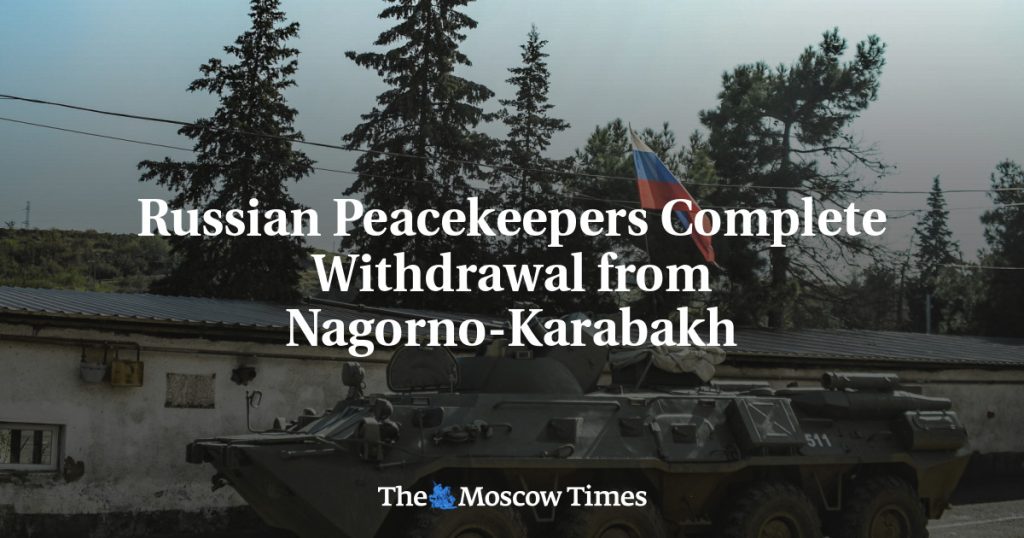The Russian peacekeepers stationed in the Nagorno-Karabakh region have completed their withdrawal, as announced by officials in Baku. The region, which had been recaptured by Baku from Armenian separatists last year, had been a point of conflict between Azerbaijan and Armenia for decades. The peacekeepers had been stationed in the region as part of a ceasefire agreement signed in November 2020, but their withdrawal was agreed upon in April between Russian President Vladimir Putin and Azerbaijani President Ilham Aliyev due to pressure on Russia’s armed forces from the war in Ukraine.
After a lightning offensive by Baku last September, almost the entire ethnic Armenian population of around 100,000 in Nagorno-Karabakh fled to Armenia to escape potential reprisals and repression. The peacekeeping contingent, which remained neutral during the conflict, did not intervene during the offensive. Despite being historically home to a majority Armenian population, Nagorno-Karabakh is internationally recognized as part of Azerbaijan. Pro-Yerevan separatists had controlled the territory for nearly three decades prior to the conflict, leading to tension between Russia and Armenia as Yerevan accused Moscow of failing to protect it from Azerbaijani threats.
In response to the loss of Nagorno-Karabakh and strained relations with Russia, Armenia has sought to strengthen ties with the West by deepening its security alliances. The Armenian Foreign Minister and the United States Assistant Secretary of State for Europe and Eurasia recently issued a joint statement agreeing to upgrade the status of their bilateral dialogue to a Strategic Partnership Commission. Last month, Armenia returned four frontier villages to Azerbaijan that it had captured in the 1990s, a move aimed at securing a definitive peace deal with Baku. However, the decision sparked mass protests in Armenia, indicating a divide among the Armenian population regarding the country’s foreign policy decisions.
The withdrawal of the Russian peacekeepers from Nagorno-Karabakh marks the end of their mandate to remain in the region until 2025, in accordance with the ceasefire agreement between Azerbaijan and Armenia. The completion of the withdrawal process on June 12 included the removal of manpower, weapons, and equipment of the peacekeeping contingent. The agreement for the withdrawal had been made between the leaders of Russia and Azerbaijan, with the withdrawal process commencing in April. The peacekeepers’ departure leaves Nagorno-Karabakh without a neutral force to monitor and maintain peace in the region, raising concerns about potential future conflicts or tensions between Azerbaijan and Armenia.
The conflict in Nagorno-Karabakh has been a long-standing point of contention between Azerbaijan and Armenia, with two wars fought over control of the region in 1988-1994 and 2020. The lightning offensive by Baku last year led to a refugee crisis as the local ethnic Armenian population fled to Armenia, fearing reprisals. The peacekeeping contingent, which had been stationed in Nagorno-Karabakh since the ceasefire agreement in November 2020, did not intervene during the offensive. Despite the majority Armenian population in the region, Nagorno-Karabakh is internationally recognized as Azerbaijani territory, further complicating the conflict dynamics between the two countries. The withdrawal of the Russian peacekeepers signifies the end of their role in maintaining peace in the region, leaving Azerbaijan and Armenia to determine their future relations and potential conflicts without neutral oversight.


